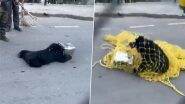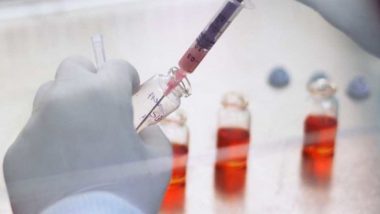London, Jun 16: A new, experimental anti-viral treatment used for some worst-affected COVID-19 patients has been found to save lives, according to the results of a UK trial on Wednesday.
In the ongoing Randomised Evaluation of COVID-19 Therapy (RECOVERY) trial, Regeneron Pharmaceuticals' combination of drugs was found to benefit patients with severe symptoms of the virus who had not mounted a natural antibody response of their own. COVID-19 Oral Antiviral Pill Could Be Ready by End of 2021, Says Pfizer CEO Albert Bourla.
It not only cut down the numbers requiring a ventilator, among the 9,875 people who took part in the trial between September 2020 and May this year, but also reduced the duration of their hospital stay.
Sir Peter Horby, Professor of Emerging Infectious Diseases in the Nuffield Department of Medicine, University of Oxford, and Joint Chief Investigator for the RECOVERY trial, declared the results as “very exciting”.
“The hope was that by giving a combination of antibodies targeting the SARS-CoV-2 virus we would be able to reduce the worst manifestations of COVID-19.
There was, however, great uncertainty about the value of antiviral therapies in late-stage COVID-19 disease,” said Horby.
“It is wonderful to learn that even in advanced COVID-19 disease, targeting the virus can reduce mortality in patients who have failed to mount an antibody response of their own,' he said.
The treatment uses a combination of two monoclonal antibodies – casirivimab and imdevimab, known as REGEN-COV in the US – that bind specifically to two different sites on the coronavirus spike protein, neutralising the ability of the virus to infect cells.
“We now know that this antibody combination is not only bad for the virus but it is also good for the sickest patients who have failed to mount a natural immune response of their own,” said Sir Martin Landray, Professor of Medicine and Epidemiology at the Nuffield Department of Population Health, University of Oxford, and Joint Chief Investigator of the trial.
“That is excellent news – it is the first time that any antiviral treatment has been shown to save lives in hospitalised COVID-19 patients. We are incredibly grateful to the many NHS staff and patients who have contributed to today's discovery,” he said.
Among patients who were “seronegative at baseline”, or that they had not mounted a natural antibody response of their own, the antibody combination significantly reduced the primary outcome of 28-day mortality by one-fifth compared with usual care alone.
Thus, for every 100 such patients treated with the antibody combination, there would be six fewer deaths, the trial found.
The National Health Service (NHS) is planning to make use of this antibody injection within the community to avoid people having to require hospitalisation at all.
“These encouraging results from this trial carried out in and by the NHS suggest a new treatment option to help save the lives of some patients hospitalised with COVID and are the latest example of research and innovation for patients, which the NHS has played a role in during the pandemic,” said Professor Stephen Powis, National Medical Director for NHS England.
Kimberley Featherstone, 37, was treated at Huddersfield Royal Infirmary and Calderdale Royal Hospital and randomly allocated to the monoclonal antiviral antibody combination.
“I was certainly glad to take part in the RECOVERY trial. I feel very lucky that the trial was up and running by the time I was taken to hospital with COVID-19, and I was able to receive this ground-breaking treatment. I'm happy that by participating, I played a part in finding out this treatment is successful,” she said.
The preliminary results of the evaluation of the monoclonal antibody combination will be available as a pre-print, to then be submitted to a leading peer-reviewed medical journal.
“This very important finding means, for patients hospitalised with COVID-19 who do not make their own antibodies to the virus, being treated with antibody-based drugs to the spike protein can reduce their risk of death and time spent in hospital," said Professor Fiona Watt, Executive Chair, Medical Research Council, which helped fund the study.
"Patients who have made their own antibodies to the virus do not benefit from the new treatment, which is also important information given the cost of drugs,” Watt said.
Professor Nick Lemoine, Medical Director at the National Institute of Health Research (NIHR) Clinical Research Network, added: “It is fantastic news that the RECOVERY trial has provided evidence to establish another lifesaving treatment against COVID-19 through this monoclonal antiviral antibody combination.”













 Quickly
Quickly





















